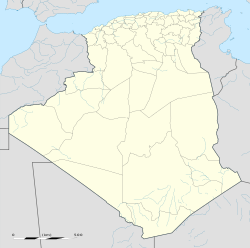Thagaste

Thagaste on the map of Numidia, just south of Huppo Regius, "Atlas Antiquus", H. Kiepert, 1869
|
|
| Location | Algeria |
|---|---|
| Region | Souk Ahras Province |
| Coordinates | 36°17′11″N 7°57′04″E / 36.286389°N 7.951111°E |
Thagaste (or "Tagaste") was a Roman-Berber city in present-day Algeria. It is now called Souk Ahras. The town was the birthplace of Saint Augustine.
Thagaste was originally a small Numidian village, inhabited by a Berber tribe into which Augustine of Hippo was born in AD 354. His mother Saint Monica was a Christian and his father Patricius (with Roman roots) was at first a pagan who later adopted Christianity.
The city was located in the north-eastern highlands of Numidia. It lay around 60 miles (97 km) from Hippo Regius, (modern Annaba), 20 miles (32 km) southwest of Thubursicum (Khamissa), and about 150 miles (240 km) from Carthage (on the coast of Tunisia).
Thagaste was situated in a region full of dense forest. In antiquity, this area was renowned for its mounts, which were used as a natural citadel against different foreign invaders, including the Romans, the Byzantines, the Vandals, and the Umayyads.
During the Roman period, trading increased in the city, that flourished mainly under the rule of Septimius Severus. Thagaste became a Roman municipium in the first century of Roman domination. The city was mentioned by Pliny the Elder. As a municipium, Thagaste was settled by a few Roman Italian immigrants, but was mainly inhabited by romanized native Berbers.
Indeed, Roman historian Plinius (V,4,4) wrote that Tagaste was an important Christian center in Roman Africa. It had a basilica and a Roman Catholic diocese, the latter of which was the most important in Byzantine Numidia. There are three bishops of Thagaste historically known: Saint Firminus, Saint Alipius (friend of Saint Augustine) and Saint Gennarus.
...
Wikipedia

